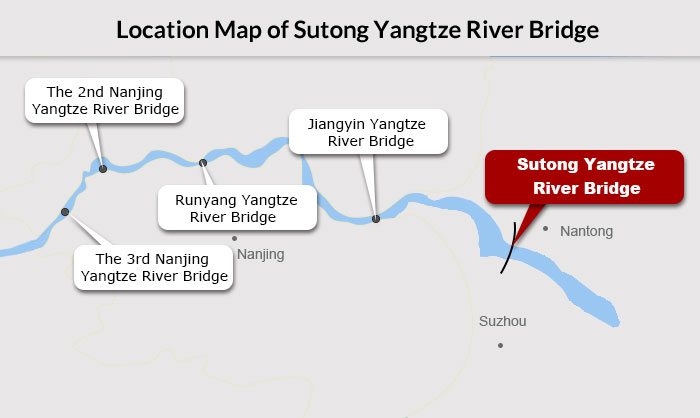Sutong Yangtze River Bridge
 |
| Location Map of Sutong Yangtze River Bridge |
Structure and Length of Sutong Bridge
The Sutong Yangtze River Bridge comprises the cross-river bridge, as well as the approaches on the north and south banks, with a total length of 32.4 kilometers (20.2 miles). The cross-river bridge has a length of 8,146 meters (8,909 yards); the approach on the north bank is 15.1 kilometers (9.4 miles), and the approach on the south bank is 9.1 kilometers (5.7 miles).
What makes Sutong Yangtze River Bridge outstanding? – 4 World Records
![]() Record 1: When the Sutong Yangtze River Bridge was open, it became the bridge with the longest main span worldwide, at 1,088 meters (1,190 yards).
Record 1: When the Sutong Yangtze River Bridge was open, it became the bridge with the longest main span worldwide, at 1,088 meters (1,190 yards).![]() Record 2: It had the highest bridge tower in the world. The bridge tower is 300.4 meters (328.5 yards) high, surpassing that of Akashi-Kaikyo Bridge in Japan.
Record 2: It had the highest bridge tower in the world. The bridge tower is 300.4 meters (328.5 yards) high, surpassing that of Akashi-Kaikyo Bridge in Japan.![]() Record 3: The stayed-cables of Sutong Bridge were the longest throughout the world, at a miximum length of 577 meters (631 yards).
Record 3: The stayed-cables of Sutong Bridge were the longest throughout the world, at a miximum length of 577 meters (631 yards).![]() Record 4: The foundations of the main pier consists of a group of 131 piles, 40 meters (44 yards) deep under water, which was the world's deepest and largest bridge foundation.
Record 4: The foundations of the main pier consists of a group of 131 piles, 40 meters (44 yards) deep under water, which was the world's deepest and largest bridge foundation.
These engineering data broke world records when the bridge was finished and opened on June 30, 2008. Although it has now been surpassed by newer bridges, it is still a milestone in Chinese bridge history.
What’s more, Sutong Yangtze River Bridge can withstand a wind at the speed of 50 m/s (55 yd/s), and the main structure can withstand a wind speed of 75 m/s (82 yd/s). In other words, the Sutong Bridge is designed to resist typhoons of scale 15, and the main structure is able to witstand super typhoons of scale 18.
Benefits of Sutong Yangtze River Bridge
In the past, when there was no bridge in Nantong, all the people and vehicles needed to take the ferry to cross the Yangtze River to reach Suzhou, which took about 40 minutes, one hour when the time for queueing was included. In times of heavy fog and strong wind, the ferry service would be suspended. After Sutong Bridge was open, vehicles traveling between the two cities do not need to take the ferry or take detours to travel via Jiangyin Bridge, Runyang Bridge, or even Nanjing anymore. They can cross Yangtze River in around 10 minutes, travel from Nantong to Suzhou in about 100 minutes and to Shanghai in about 2 hours.
Construction Schedule of Sutong Bridge
Initially, the local government intended to build a cross-river tunnel to solve the traffic problem. Later, experts suggested building a bridge rather than a tunnel, so the project of Sutong Yangtze River Bridge began. In June 2003, the bridge construction officially commenced. By July 2004, all the parts on water were being constructed. In September 2006, the bridge towers were capped. In January 2007, the south and north sections of the cross-river bridge joined. In January 2008, Sutong Yangtze River Bridge was inspected; and it officially opened to traffic on June 30th, 2008.
Sutong Bridge Exhibition Hall
Opened on Oct. 19th, 2008, the Exhibition Hall is located on the south side of Sutong Yangtze River Bridge. Covering a total display area of 3,500 square meters (4,186 sq yd), Sutong Bridge Exhibition Hall is a three-storey center showing the entire construction process, especially the scientific studies, independent research, key technologies and creativity applied during construction.![]() Read More:
Read More:
Yangtze River Bridge: How many bridges are there over Yangtze?